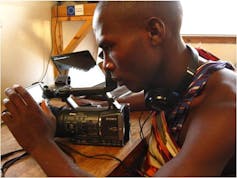My gape of interplay between tourists and a Maasai community raised questions about the boundaries between analysis, tourism and entertainment. For one factor, the local Maasai on the total classify in a single other country company, whether researchers, NGO workers, businessmen or tourists, within the similar class. I moreover chanced on that execrable-cultural interactions don’t consistently again to fall down stereotypes.
The gape became as soon as share of a yr of fieldwork with Maasai engaged in a dinky, within the community owned ecotourism mission in Northern Tanzania. The mission presents camel safaris for tourists.
The mainly European and American tourists moreover visit a Maasai home as share of the safari. Ensuing from tourists are scarce on this home and it is advanced to maintain arrangement quiz of a visit, local other folks are in overall caught without warning when a community of tourists walks into their village. The tourists most incessantly preserve for 20 minutes to an hour, having a peep on the cattle corral and at other folks’s properties.
My analysis presents an intensive description of “Maasai” and “tourist” views of each diverse, and how these views are influenced as a outcomes of their encounters. It shows how and why tips on “the diverse” persist even within the event that they enact now no longer match other folks’s experiences.
The conclusions of my analysis led me to divulge a transient film – “Eliamani’s Dwelling”. The film illustrates about a of my most essential findings on host-guest encounters. Viewers apply the ride of a community of Dutch tourists visiting a young mother, Eliamani, and her family. Four languages – Maa, Swahili, Dutch and English – are spoken, and all conversations are subtitled.

Vanessa Wijngaarden, Author equipped
Parallel fears
Why enact these encounters occur, anyway? Vacationers tell they visit Maasailand because they’re attracted to cultural distinction. The Kenyan and Tanzanian Maasai basically have interaction in tourism as a outcomes of the industrial distinction between them and the company, and so that they supplement their earnings by selling safaris and artefacts.
Their incentives and their fears when interacting are intimately linked and there are some striking parallels.
The Maasai and tourists peril being considered as naive or ignorant by the diverse occasion. They peril being exploited. Both side exaggerate the income the diverse makes within the uncover. Maasai overestimate what quantity of cash tourists could moreover maintain from taking photographs. Vacationers blow out of share the price their money has in Maasailand.
Both side peril that the diverse is acting purely out of slim self-hobby. Vacationers terror that Maasai have interaction with them only to sell beads and Maasai terror that tourists’ only want is to steal photographs. Each and every side wonders if the diverse’s obvious friendliness is faux.
The particulars of the discussions about prices and payments expose that the couple of Euros enraged by purchasing artefacts are now no longer the effort off of the emotional outbursts of the tourists, as but another it is peril of lack of face. In the similar formulation, Maasai peril the tourists will non-public an interest only in their cultural otherness, and encourage in mind them now no longer as other folks, nevertheless as a spectacle. A transparent instance is when Eliamani runs within the again of the home to fly from the tourist camera’s behold, because she fears the company are ridiculing her.
Confronting behold
So it is miles now no longer all about discipline subject interests and exploitation. Both side are interested by how they’re perceived. They’re now no longer so grand acting on the image they’ve of “the diverse”, nevertheless reacting to the image they think “the diverse” has of them.
In psychology it has long been seen that “the presumed picture the diverse has of me” is of large importance in interactions between other folks of diverse cultures. In this context, psychologists Claude Steele and Joshua Aronson described the phenomenon of the “stereotype possibility”. This proved to be widely relevant, now no longer only referring to stereotypes about minorities nevertheless moreover to these about highly efficient majorities.
Sociologist Marie-Françoise Lanfant explains that within the tourism context, the receiving society comes to reflect upon its non-public traditions and values thru the battle of words with otherness signified by the presence of tourists. The similar is appropriate for the tourists below the behold of their hosts.
Folks are in a position to have faith in themselves in others’ footwear and create a picture of how they’ll be considered.
Fifteen minutes into the documentary Eliamani all straight away turns spherical to peep straight on the filmmaker’s camera and complains about being filmed too grand. And thus the filmmaker and the viewer are suggested to reflect within the event that they’ve turn out to be share of the discipline of the voyeuristic invasion of cultural tourism.
My analysis, and the film raise questions whether watching a documentary or doing analysis are diverse from entertainment or tourism. And what does that mean for our identity as tourism researchers?

Leave a Reply